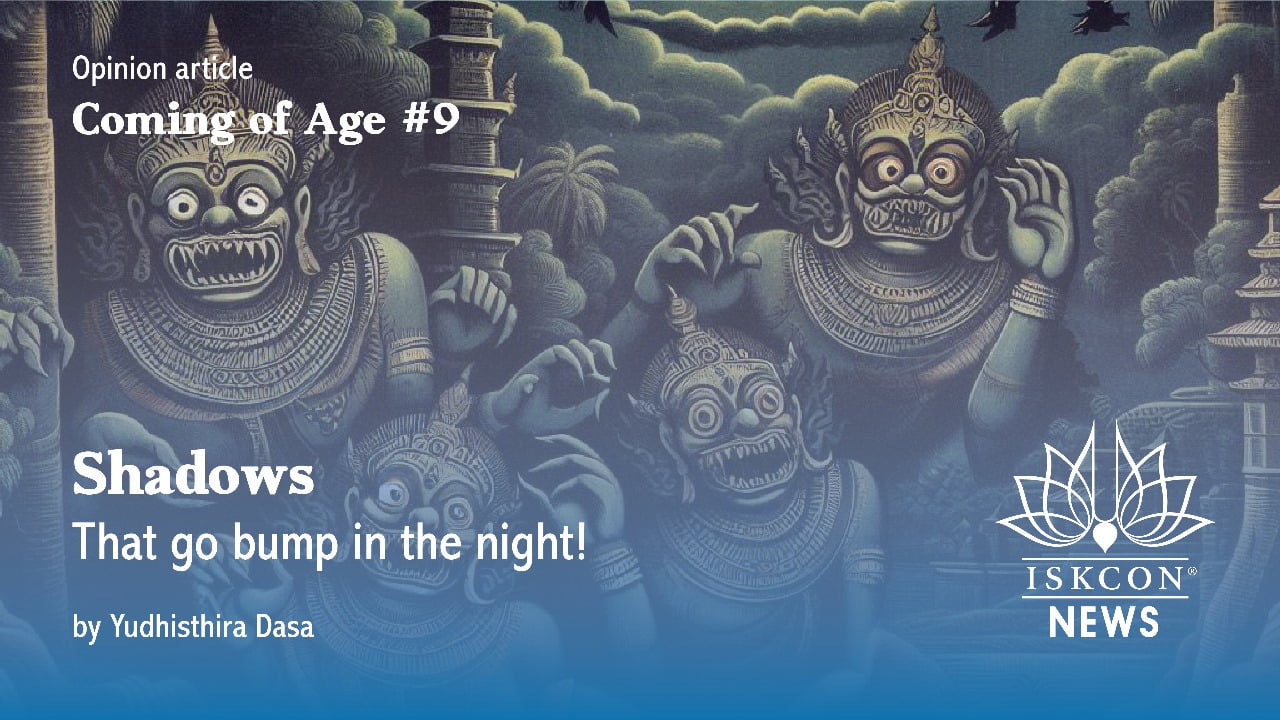COMING OF AGE #9 – Shadows that Go Bump in the Night!
By Yudhisthira Dasa | Окт 31, 2023

Everywhere in the material creation, there is duality. Light and dark. Hot and cold. Wet and dry. Happiness and suffering. And much, much more. The external person we present to others through our behavior also contains duality. Our positive side is how we want to behave and be viewed. Psychoanalyst Carl Jung used the term “shadow” to describe the behaviors we are embarrassed about due to fear of rejection as the shadows are exposed.
While we generally describe these personal consciousness dualities as “light and dark” or “good and bad,” our seemingly negative traits or habits can also be appreciated as opportunities to learn, grow, and improve. For the purpose of this blog, let’s call these our higher selves and our shadow selves.
Unfortunately, we generally judge and criticize others for what we perceive as bad habits. However, the truth is that, although discernment is essential with whom we intimately associate, the qualities in others we so often criticize (in our thoughts, words, or actions) are how God works to elevate all embodied souls gradually. So, instead of judging others, we can see Krishna’s hand as the Supreme Master Teacher and can rejoice in a loving God who gives each of us the opportunities we need to learn and grow.
The good news is that, wherever we are, we are not alone with our troubled shadow sides. A positive understanding is that there are no beautiful landscapes without shadows. In fact, shadows help us appreciate the journey of finding the light and the source of that light.
For many in this world, living in Krishna/God consciousness plays a minority role in our 24/7 existence. For others who are further along the path of self-realization, gradually living in the “light” of Krishna/God consciousness is the predominant state of our lives, with intermittent struggles with our shadow or lower selves. As Prabhupada said, “Yes. It’s like the electric fan is rotating, action and reaction, or karma, but on initiation the plug is pulled. The rotations may go on for a little while, but there’s really no more karma.”
For children, darkness can be frightening, yielding fears of demons and monsters lurking in the shadows, often causing regular nightmares for many. What do children traditionally do when they experience a fright at night, known as “bad dreams?” They run to their parents for protection. This compares to taking shelter of Guru and God at these times because, after all, there are lessons in everything in this conditioned state of human existence. With good reason, children naturally seek comfort and protection when frightened or threatened.
Personally, as I approach 70 years old in this body, my own shadows are becoming more and more clear. Here is the process to (finally) start dealing with our shadows:
1. Recognize and label the shadow. Remember that most of us have more than one! Be positive! See them as opportunities.
2. Empathize with ourselves and see our struggles from a compassionate point of view instead of being so self-critical that we live in guilt and shame.
3. Actively explore how to free ourselves from those behavior patterns with self-compassion and accepting appropriate guidance from others, whether from family, friends, or professionals.
If we accept that the material world is a learning center for struggling souls, then running away from our shadows out of denial, being frozen in place because of embarrassment or shame, or fighting with others when confronted with our shadows out of ego-driven defensiveness all allow our shadows to remain strong to plague us day after day, year after year, and lifetime after lifetime.
Anyone in the Krishna consciousness movement has already been inspired to walk the path less traveled. Acknowledging and progressively confronting our shadow selves is the next step. As Ravindra Swarupa Prabhu (very senior disciple of Srila Prabhupada) has been quoted as saying, “First we were pure devotees and then (now) we are becoming human beings.” What does this mean?
At first, many of us enthusiastically connected to the Krishna Consciousness Movement. Later in life, many of us are working on our humanity since we realize that our inner selves and outer selves were not seamlessly integrated as one. This means that our external behavior needs to ultimately line up with our hearts, without secrets and free of “shadow” behaviors. As Srila Prabhupada has written in the Science of Self-Realization, “And when the heart is cleansed, then a person becomes eligible for being freed from the clutches of maya, or the materialistic way of life.”















